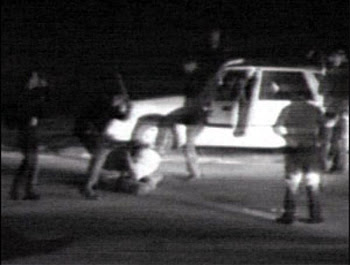Are We All Getting Along?
“Can we all get along?”
Five words. Spoken by an assaulted man. Repeated countless
times since that day twenty years ago.
Last week marked the twentieth anniversary of the Los
Angeles riots incited by citizens furious over the acquittal of four L.A.
police officers that had brutally beaten L.A. resident Rodney King.
Rodney King happened to be African American. The officers
happened to be Caucasian. And while Rodney King was no saint (he was a 25-year-old
convicted robber on parole at the time), his speeding violation and
intoxication didn’t warrant the inhumane beating he received at the hands of
the men commissioned to “protect and serve.”
And when those overzealous officers received an acquittal, the
city of L.A. turned upside down. The upheaval from those riots led to more than
50 deaths and $1 billion in property damage.
After three days of riots, King emerged from seclusion to
speak those infamous five words, “People I just want to say, can we all get along?”
People around America have been asking that same question
for the last twenty years: Can we all get along?
This past decade, I think most U.S. citizens would have
answered this question positively in regards to race relations. Many of us
would have probably stated something along these lines: Well, we’re not getting
along as well as we could, but we’re getting along a lot better than we did.
But then, something happens in our country to shake us up.
We are tested. Sifted. A flashlight beams a light right between our eyes. And
we notice our reflection in the mirror is not as lovely as we once thought.
It’s actually quite flawed.
February 26, 2012. A day in our country that tested us,
sifted us, beamed a light between our eyes. When neighborhood watchman George
Zimmerman shot and killed 17-year-old Trayvon Martin, we realized we hadn’t come
as far as we thought we had.
Almost immediately Trayvon Martin’s tragic death became a
racial battle. The African American community shouted outrage over this unarmed
teenage boy’s murder in his father’s neighborhood. We posed in hoodies, shot
pics in them and posted those pics on our Facebook profiles.
While Zimmerman awaits trial, I’ll choose not to speculate
on the specific events of that fateful night. I cannot say for sure that
Trayvon fell victim to racial profiling. And the question that will never be
answered – if Trayvon had been Caucasian, would he be alive today?
One thing’s for sure. Our country is a long way from healed
in the area of race relations. We’re not as far as we think we are.
We work together and live together, but few of us play
together. And very few of us worship
together.
In 1958, Martin Luther King, Jr. wrote these words:
“Unfortunately, most of the major denominations still practice segregation in
local churches, hospitals, schools and other church institutions. It is
appalling that the most segregated hour of Christian America is eleven o’clock
on Sunday morning, the same hour when many are standing to sing: “In Christ
There is No East or West.”
That was 1958. Unfortunately, despite a few exceptions, not
much has changed regarding eleven o’clock Sunday morning in the U.S.
But I’m grateful for the exceptions. My husband happens to
be a teaching pastor at one of the exceptions - Mosaic Church of Central Arkansas.
May we purpose to link up with the exceptions.
May we be the
exception.
Love,
Carla




Comments
Post a Comment